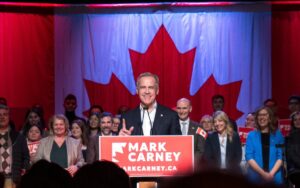
Despite the current legal limbo regarding plastics bans, British Columbia has nevertheless announced it is going ahead with a provincial ban. Pictured: British Columbia Premier David Eby. Photo Credit: David Eby/X.
Last November, the Federal court overturned Environment Minister Steven Guilbeault’s ban on plastics. The ban attempted to classify plastics as toxic under the Canadian Environmental Protection Act. The Federal Court judge rejected this argument on the grounds that there was no credible science to indicate that plastics were a toxic substance. The court also stated the plastics ban was unconstitutional as waste management is an area of provincial, not federal, jurisdiction.
After this decision, Guilbeault stated that he planned to appeal this decision but nothing has taken place as yet. Considering the relatively slow pace that courts move in Canada, it may well be that the appeal will not be heard before the next federal election, expected in October 2025 or sooner. At that time, a new government could well have an entirely different approach to the plastics issue.
Despite the current legal limbo regarding plastics bans, British Columbia has nevertheless announced it is going ahead with a provincial ban. Initially, BC rolled out bans of some plastics products last December to conform with the federal regulations that are now in question. This concerned plastic bags, cutlery, straws, some takeout containers, ring carriers and stir sticks. BC decided to delay some aspects of the ban to allow businesses more time to adapt. As of July 15, 2024, takeout containers and disposable glasses that are difficult to recycle will be banned. This includes materials made with biodegradable and compostable plastics, for some inane reason. Styrofoam containers will also be prohibited, including for products such as eggs and take-out noodles.
BC has also decided to order businesses to charge a certain amount for some items, directing that the cost must be at least $2 for reusable shopping bags and 25 cents for recycled paper bags. Some bags are exempt, such as the plastic bags used for fruits and vegetables and the small paper bags used for prescriptions. With these kinds of heavy-handed government regulations, it is always interesting to see what is exempted, as that typically happens on the basis of politics, not science, and merely shows the inconsistency of these types of policies.
The province also plans to ban other plastic items in future. For instance, on July 1, 2028 the use of clear film wrap, or cling film, will be banned and foam containers for meat will not be in use as of July 1, 2030. Although all plastic bans are questionable on many grounds, these bans planned for the future are particularly worrisome as they could compromise the safety of food products. Plastics are the ideal material to keep food sanitary and fresh at affordable prices. In addition, they have the environmental benefit of helping food to last longer, thereby reducing food waste. Plastic containers are also much lighter than alternatives, reducing the carbon footprint of transportation of the consumer products.
Plastics bans in general have been proven to be problematic for many reasons. For starters, replacements for plastics in the food industry, retail and manufacturing sectors and elsewhere are costlier than the plastics they are replacing. At a time when inflation is already a serious issue, another policy that will merely boost inflation further is not welcome. In addition, Canadians’ flirtation with alternatives to things such as plastic straws and take-out containers has not been positive as they don’t perform anywhere near as well as do the plastic products. Studies have also shown that many of the alternatives to plastic turn out to be worse for the environment than the plastic items. All too often, plastics have been vilified by climate alarmists to the point that their many advantages are downplayed and not enough attention paid to the fact that their replacements are worse in many ways.
The plastics manufacturing industry in Canada has been very innovative, and are world leaders in devising new products that are biodegradable or otherwise recyclable. There is no factual or scientific reason why governments are rejecting these creative products, as BC and the federal government have done. In fact, the industry should be encouraged to export their environmentally friendly innovations to countries that have much more serious problems with plastics pollution than does Canada. The plastics industry believes that plastic belongs in the economy, not in the environment. More comprehensive recycling programs would do much more to solve issues with plastic than the blunt instrument of bans which tend to create more problems.
Considering the uncertain legal status of plastic bans in Canada, it seems that the only reason BC would move ahead with the ban at this time is political virtue signalling. A provincial election is scheduled for this October, and a few months ago the current NDP government was expected to win in a landslide. More recently, the new Conservative Party of BC led by John Rustad has made amazing inroads in a very short period of time, to the point that the two parties are now neck-and-neck in the polls. The recent ban on plastics by the NDP government is likely an attempt to consolidate the government’s environmental credibility over the Conservatives.
In other plastics news, federal minister Guilbeault has also declared his plans to create a “plastics registry,” which would track the life cycle of a plastics product from creation to end-use to disposal. This would undoubtedly be a costly red tape nightmare that would burden the Canadian industry to the point of being uncompetitive. Some recent investigation has also shown that such a registry would breach the USMCA trade agreement, which would indicate such a policy is a non-starter. It seems that the federal ministry of the environment doesn’t do its homework very well before creating policies, as so much of what they have done has been rejected by the courts or found to be inconsistent with other government policies such as trade agreements.
As this author has reported previously, there are many international efforts to limit or ban various plastic products. Last April, a major United Nations meeting was held in Ottawa to make inroads on these goals. Most of these efforts have failed, and for good reason. Plastics form an integral part of our consumer products, essential business needs, irreplaceable elements of our health care system and food packaging industry, and much more. Currently, there are no good replacements for plastics from a cost, efficiency and environmental standpoint. The focus of governments should be more practical and undertake better recycling programs and an acceptance of the innovative products of the Canadian plastics industry that are effective and more climate-friendly. As its usually the case, the knee-jerk bans motivated by politics will cause more problems than they will solve.

She has published numerous articles in journals, magazines & other media on issues such as free trade, finance, entrepreneurship & women business owners. Ms. Swift is a past President of the Empire Club of Canada, a former Director of the CD Howe Institute, the Canadian Youth Business Foundation, SOS Children’s Villages, past President of the International Small Business Congress and current Director of the Fraser Institute. She was cited in 2003 & 2012 as one of the most powerful women in Canada by the Women’s Executive Network & is a recipient of the Queen’s Silver & Gold Jubilee medals.



















